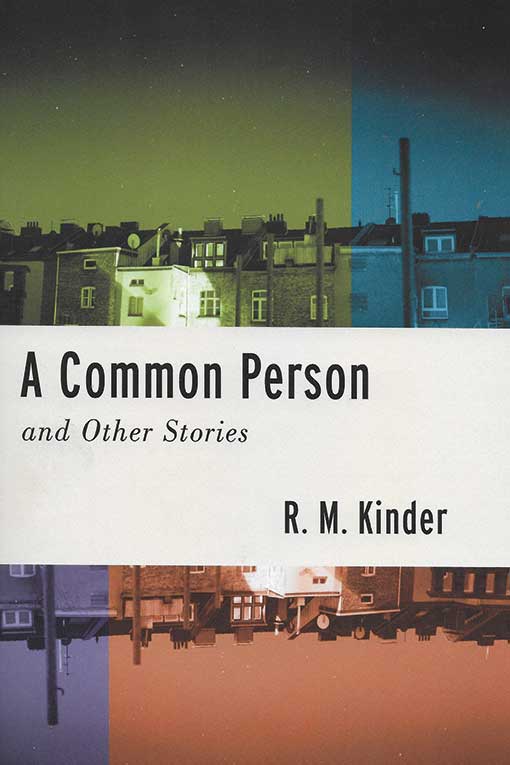R. M. Kinder, 200 pages, fiction, Notre Dame Press, softcover, $23
It could happen to you. We tend to associate the phrase with personal tragedies ripped from the headlines, and for the protagonist of “A Common Person,” the titular story in R.M. Kinder’s new collection of short stories, it kind of is. A Facebook post with a violent connotation, posted and then hastily deleted, lands Maggie in a sterile detention center, with the sordid tendrils of her past suddenly thrust under scrutiny that would have been unthinkable just one day prior. But if Kinder’s collection of stories shows readers anything, it’s that that phrase—it could happen to you—can have positive connotations as well.
In “A Common Person,” Maggie’s flippant social media post leads to her having to confront seemingly benign events from her past that suddenly turn malignant. A stolen pistol would go on to be used in an armed robbery. Another gun, this one lent to Maggie’s then-boyfriend, would be used in an attempted rape unbeknownst to her. Maggie’s penchant for gun ownership and a few unfortunate coincidences suddenly paint a picture of her personality that looks very different from the way she sees herself.
That aspect of the story, too, is broadly applicable to most people. And upon further internal examination Maggie realizes that, although she considers herself violence-averse, she isn’t immune to the occasional intrusive thought. Kinder writes, “When she disliked someone immensely, an unbidden image of the shot—not the victim, just the aiming and the trajectory and the specific impact point—rose.”
Other characters, too, encounter situations that could have been sourced from any of our lives, such as trying to show compassion toward a neglected animal, or misadventures in the search for romance. And these stories do what fiction tends to do at its best—expose the sublime beauty and tragedy of everyday life.
Although not all of Kinder’s stories point out the names of the cities and states they take place in, there exists in them a strong sense of place nevertheless. In the titular story the protagonist lives in an unidentified town somewhere not too far, presumably, from Kansas City, and the small, effective details Kinder relays of the place bring many Missouri towns to mind.
One such place is Warrensburg, which Kinder has a connection to as a former professor of English at University of Central Missouri. During her time there she was editor of Pleiades, a literary journal published through the university, and she established Pleiades Press, both of which she still reads for today.
A Common Person and Other Stories is Kinder’s third collection of short stories, and it is the winner of the Richard Sullivan Prize in Short Fiction. Kinder is no stranger to prestigious literary awards, all three of her story collections have won prizes, and if you’ve had a close encounter with her prose—fastidious and urgent but with the humor and self-awareness of Twain—it isn’t hard to see why. The collection brings out the triumph, violence, and profound ambiguity lurking beneath the surface of everyday life. It is more than worthy of its acclaim and ought to garner scores of readers who may find themselves face to face with their own reflections in its pages.
More Great Reads
By Amy Stapleton
100 Things To Do In Missouri Before You Die
John W. Brown and Amanda E. Doyle, 192 pages, nonfiction, Reedy Press, softcover, $19.95.
Looking for a way to spend your next three-day weekend? This book has ideas ranging from food and drink to culture and history. It also includes suggested itineraries to make planning easier. Sprinkled throughout the book are travel tips and a list of activities by season and region.
Extraordinary Black Missourians (2nd Edition)
John A. Wright Sr., Sylvia A. Wright, John A. Wright Jr., 256 pages, nonfiction, Reedy Press, softcover, $19.95.
More than one hundred historically significant Black Missourians are profiled in this new book, including a few born before 1800. You’ll find famous names you already know from pop culture and history alongside more obscure figures whose stories you may be reading for the first time.
The Hill: St Louis’s Italian American Neighborhood
LynnMarie Alexander, 192 pages, nonfiction, Reedy Press, hardcover, $39.95.
This beautiful coffee table book offers a view into the immigrant experience by tracing the history of St. Louis’s iconic The Hill neighborhood from the turn of the twentieth century to present day. Every page is filled with historic photos and personal accounts from the people who lived in the Little Italy of St. Louis.
General Emory Upton in the Civil War: The Formative Experiences of an American Military Visionary
Robert N. Thompson, 204 pages, nonfiction, McFarland Press, softcover, $39.95.
Although General Emory Upton played a crucial role in the Civil War, many aren’t familiar with his story. Robert N. Thompson sets about righting that with this book detailing Emory’s wartime experiences and helping punctuate his importance.
Violet Roses
Kathleen Elinor, 32 pages, fiction, Westbow Press, softcover, $16.95.
Written and illustrated by St. Louis artist Kathleen Elinor, This book uses inspirational poems of a Christian nature to describe the beautiful illustrations of birds and blooms that are printed alongside them.
Finding the American Dream
Bill Clevlen, 208 pages, nonfiction, Reedy Press, softcover, $22.50.
Stories of how famous Americans got their start are the subject of this book, which includes Walt Disney in Marceline and Walter Cronkite in St. Joseph. It also contains destinations for each figure profiled and trivia facts go with each story.
Nuts About Squirrels
Don H. Corrigan, 226 pages, nonfiction, McFarland Press, softcover, $29.95.
St. Louisan Don H. Corrigan’s book takes a slightly nutty topic—squirrels—and shows us how they are the stuff of legend, making all kinds of appearances in our pop culture and skittering into other surprising places.
Do What Jesus Would Do (DWJWD)
Shelby Seelinger, 83 pages, nonfiction, Outskirts Press, softcover, $11.95.
Shelby Seelinger, a retired minister and US Navy chaplain living in Warrensburg, wrote this book using the teachings of Jesus Christ to spread the word that we should treat one another with kindness and thoughtfulness, especially during these turbulent times.
The 1849 Cholera Outbreak in Jefferson City
Gary Elliott, 144 pages, nonfiction, Arcadia Press, softcover, $21.99.
Cholera came to Jefferson City on a steamship named James Monroe, and this book details the story of the outbreak through personal accounts of residents and historical primary sources.
Photo // The Publisher
Related Posts
Book Review: Great River City
A new coffee table book looks beneath the surface of St. Louis’s river history
Book Review: Midwest Architecture Journeys
A new title from Belt Publishing explores the architecture of the region.
Book Review: Prairie Wildflowers
Prairie Wildflowers provides a companion on journeys through Missouri’s grasslands and beyond.




